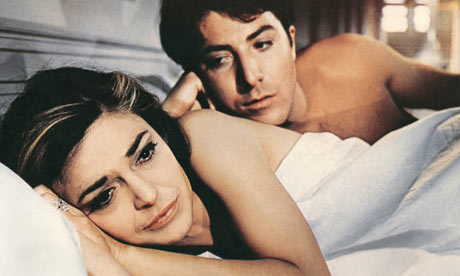
No headline writer could resist it. Had I been writing headlines, I probably couldn't have resisted it either. Here's to you, Mrs Robinson!
This was the jokey phrase almost every paper attached to the bizarre, melancholy and politically murky story from Belfast. Iris Robinson, the wife of DUP leader Peter Robinson, had an affair with one Kirk McCambley two years ago, when their ages were 59 and 19 respectively, and solicited £50,000 from two property developers to help him set up a cafe, keeping £5,000 for herself. These were property developers whose business interests she was incidentally in a position to advance. The affair has ended with Mrs Robinson's attempted suicide, Mr Robinson's anguish and political embarrassment as Northern Ireland's first minister, and the possible destablisation of power-sharing with Sinn Fein.
What a grisly, painful story. But the "here's to you" gags keep coming. Now Belfast radio stations are reportedly bombarded with requests to play the toe-tapping Simon and Garfunkel song. This was the soundtrack centrepiece to Mike Nichols's classic 1967 film The Graduate, in which Dustin Hoffman played a shiftless college graduate who tumbles into an affair with Mrs Robinson, the fatale-sexy wife of his dad's business partner, played by Anne Bancroft.
For over 40 years, that iconic film has helped reinforce the perception that cradle-snatching sex is pretty hilarious so long as it's an older woman and a younger man. Only this week, in Nancy Meyers's romcom It's Complicated, Meryl Streep's ex-husband Alec Baldwin makes an attempt to play happy families with Meryl and their three grownup children by putting on a video the way he used to in the old days. And the film is … The Graduate, perfect innocent-yet-sophisticated fun.
Iris Robinson from real life and Mrs Robinson from the film could not be more different. In Belfast, there were 40 years between the lovers. On film, well – Hoffman's character Benjamin is young, certainly, but the very title emphasises that he has adult status: a college graduate. Hoffman was a young-looking 30-year-old when the movie came out, and Bancroft an adult 36.
In the movie, Mrs Robinson is bored, unsatisfied, fond of a drink or three in the American suburban tradition, and obscurely nettled by the plan to pair off her daughter Elaine, played by Katharine Ross, with Ben. Some half-buried competitive instinct could be at work. The affair plays itself out over a long, hot summer, but Ben comes to conceive a more romantically and politically correct love for Elaine. Basically, what is going on in Mrs Robinson's head and heart is not of overwhelming interest: she is just a sexy, vampy older woman, a fascinating narrative phase, and her feelings are not important as such – at least not as important as Elaine's and Ben's.
From the real world, the news is darker and stranger. Iris Robinson is no bored housewife but a real political player, a woman in a man's world. She is the "business partner" in this scenario. Her affair and its desolate aftermath appear to have been mixed up messily with romantic feelings, protective and maternal feelings, feelings about money and self-esteem, feelings about the elaborate identity carapace that everyone in the public eye builds up over time. Iris Robinson, though more glam than her husband, had a reputation for being a conservative Christian. Notoriously, she had condemned homosexuality because it is forbidden in the Bible. (So is adultery, of course.)
She appears genuinely never to have set out, like Anne Bancroft's comically predatory swinger, to seduce. Her feelings morphed from the maternal into something else. And that shady financial transaction – was its very shadiness Mrs Robinson's way of making the affair more palatable? After all, financial transgressions might well have seemed much less serious to her than having sex with a teenager, and money-related skulduggery might have been a way of proving to herself that she was in control, that she was indulging in some tough old-school politicking, weighing up the score, looking after No 1.
Either way, the contrast between this grim and tragic story and the quaint romance of The Graduate couldn't be plainer. Maybe it's time to take Simon and Garfunkel off the turntable.







